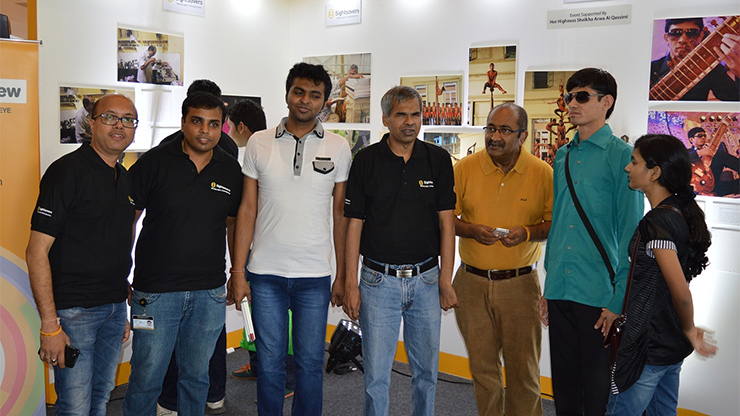
To mark the International Day of Persons with Disabilities, the New Delhi chapter of the British Council featured an exhibit of photography by the blindearly in December. The key pieces of the exhibit were roughly thirty photos that highlighted the themes and challenges of blind life as well as blind photographers and subjects engaged in all manner of activities, including their normal jobs.
The exhibition was set up by Sightsavers, an NGO that focuses on treating and preventing blindness and engages in advocacy for the blind on social, political, and accessibility levels. Sightsavers has been active in India since 1966, and since then has been able to interact with 53.4 million people, treated eye problems 66.2 million times, and have performed 4.9 million eye surgeries. The photos shown at the British Council were part of a series of exhibitions collectively titled“The Blind View” that also included workshops for blind photographers run by Sightsavers in partnership with the Beyond Sight Foundation and the support of Her Highness Sheikha Arwa Al Qassimiof the royal family of Sharjah and Ras Al Khaimah in the United Arab Emirates.
Those with the ability to see think of the art of photography as another part of their ability to see, a way to capture moments to be savored and enjoyed later.
Though the blind suffer a lack of vision, they often enjoy stronger forms of their other senses. The Blind View exhibitions helps bring these experiences to the larger public and pushes against the idea that blindness is only a disability.
For most people, the question remains: how would blind people go about engaging in photography? The answer is that they use their other senses of touch and smell to incorporate the textures and aromas of their subjects into their work. The famed blind photographer Buvesh Patel used such senses when he was commissioned to shoot a Lux Perfume Portraits advertisement featuring Bollywood actress Katrina Kaif.
The website for The Blind View (www.theblindview.in) listed sixteen photographs on its website from which visitors to the site could vote for their favorite. Included among these photos were
famous sites in Delhi such as the India Gate, the QutabMinar and the iron pillar; additionally, there were pictures of a male dancer and of blind people in various day-to-day activities.
The Beyond Sight Foundation—which helps people with vision loss explore the art and hobby of photography—joined with Sightsavers in holding two workshops in Mumbai and Bangalore. Out of these workshops came photographs that were shown to the public in exhibitions in those cities and also in a final event in Delhi. On top of that, they were put up in online exhibitions where anyone can see them.
At the culminating Delhi event, present were Raghu Rai, the famous photojournalist and photographer, RN Mohanty, the of CEO, Sightsavers’ Indian branch, Gill Caldicott, Director Operations, British Council India, and ParthoBhowmick, the founder of the Beyond Sight Foundation.
“This initiative is our effort to showcase the glimpses of the life of a blind person – how they perform their daily chores, how they use assistive technology to their advantage at the office and so on,” explained Mohanty.
Mr Bhowmick added that “The photography workshop took place earlier this year and the participants were trained to click perfect pictures under skilled supervision.” He was quick to point out that “The workshop had also witnessed participation of a renowned visually impaired photographer Bhavesh Patel, who did a photo-shoot of Bollywood actress Katrina Kaif.”
“British Council,” Caldicott added,“is delighted to partner with Sightsavers to provide a platform to these amazingly talented photographers to project their work.” Continuing on, he noted that “Sightsavers’ photography exhibition is a great initiative which not only showcases the work and talent of the visually impaired, but also gives a chance to the general public to appreciate the beauty pictured by them in their photographs.”
Sightsavers, in cooperation with Hosla Charitable Trust, also included a musical performance from blind singers at the photography exhibit. The exhibit closed out with various activities for those in attendance that allowed them to experience various aspects of life for the visually impaired.